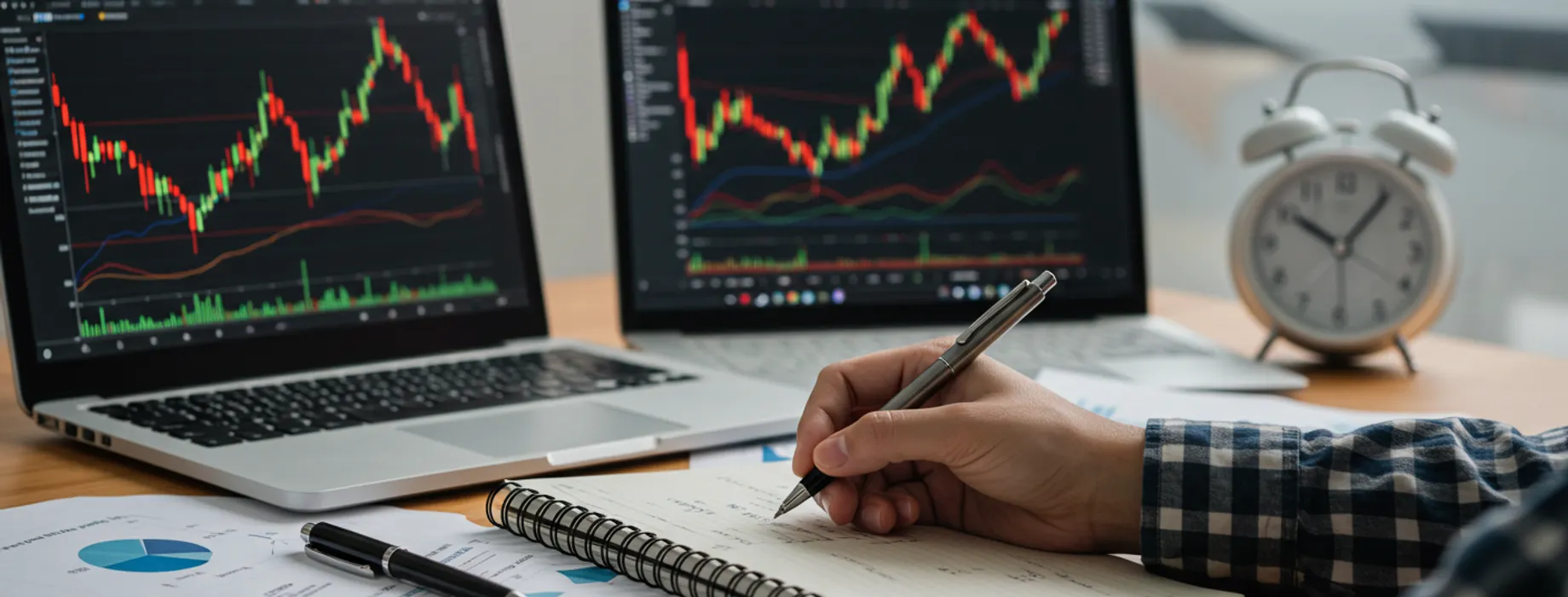- Establishing currency prices in relation to others.
- Allowing hedges against risk in foreign currency investments.
- Facilitating fund transfers between countries.
- Financing international trade, which represents a significant portion of the forex market.
Beginner's Guide to Forex Trading

The Forex, or foreign exchange market, is the global financial space where currencies are bought and sold. It is the largest and most liquid market in the world, allowing the exchange of currencies for international transactions. Its objective is to make it easier for people and companies to carry out operations with different currencies, contributing to the global economy. It is often referred to as FX or Foreign Exchange Market.
The Forex market operates through currency pairs, where one currency is bought while another is sold simultaneously. Prices are determined based on these pairs, which include a base currency and a quoted currency, such as GBP/USD or GBP/EUR. The main functions of the foreign exchange market are:
Currencies are identified by a three-letter code (ISO 4217) and currency pairs have a six-letter expression. For example, in the GBP/USD pair:
- The first three letters represent the base currency (GBP).
- The last three letters represent the quoted currency (USD).
- The price of the pair indicates how many units of the quoted currency are needed for one unit of the base currency.
Types of Currency Pairs
In Forex, there are three main categories of currency pairs:
- Major Pairs: The most traded pairs, such as GBP/USD and EUR/GBP.
- Minor Pairs: Combinations of currencies that don’t include the US dollar.
- Exotic Pairs: Combining a major currency with one from a developing country, usually with lower liquidity.
Advantages of Trading Forex in the UK
- High Liquidity: Facilitates easy buying and selling of currencies.
- Availability: Market open 24 hours Monday through Friday.
- Decentralisation: No single entity controls the market, providing greater freedom.
- Low Trading Costs: You typically only pay the spread.
- Leverage Opportunities: Allows maximising capital efficiency.
- Wide Variety of Currency Pairs: Many options to choose from.
- Demo Account: Ideal for practice without financial risk.
Potential Disadvantages
- Regulatory Complexity: While regulated in the UK, global forex markets vary in oversight.
- High Risk: Price fluctuations can be rapid and dangerous.
- Fees: Costs associated with brokers can impact profitability.
- Leverage Risk: Can increase both gains and losses.
- Market Volatility: Increases during publication of important economic data.
How to Invest in Forex
To begin investing, it’s essential to understand market characteristics. Financial education is key, and expert advice can help minimise risks. It’s important to choose a reliable and regulated broker, open an account on a trading platform, and have capital to invest that’s adapted to your objectives and risk tolerance. UK investors typically start with £500-£2,000, though practice accounts allow risk-free learning.
Forex Instruments
- Spot Operations: Currency purchases and sales settled within two business days.
- Forward Operations: Agreements fixing price and quantity of currencies, with settlement occurring in the future.
- Currency Derivatives: Products such as options, futures, non-traded contracts, and swaps.
UK Financial Regulation
The Financial Conduct Authority (FCA) regulates and licenses firms operating in the UK financial market, ensuring they meet required standards. The FCA works alongside the Prudential Regulation Authority (PRA) to maintain market integrity and protect consumers. UK traders should verify their broker holds FCA authorisation by checking the Financial Services Register.
What is an FCA licence?
An FCA licence is a permit that allows operation in the British financial market and represents prestige for those who obtain it, as it means the company is complying with all the requirements that the FCA mandates. FCA-regulated brokers must maintain capital adequacy requirements and keep client funds in segregated accounts.
Basics Every Trader Should Know
Familiarise yourself with essential terms when starting in currency trading:
- GBP/USD: Currency pair between the British pound and US dollar.
- Pip: Minimum unit of measurement in the value of a currency pair.
- Buy/Sell Prices: Two prices; the buy and sell price.
- Spread: Difference between the buy and sell price.
- Lot: Measurement unit in Forex, in standard, mini, micro, or nano sizes.
- Leverage: Allows trading with more capital than available.
- Margin: Capital necessary to open a leveraged position.
- Margin Level: Relationship between available capital and used margin.
- Position: Reflects open operations in the market.
Three Key Points When Choosing Your Broker
- Fund Segregation: Ensure your money is used only for your investments and held separately from the broker’s operational funds.
- Regulation: Verify the broker is regulated by the FCA or another reputable authority.
- Support: Look for brokers offering effective customer service, ideally with UK-based support teams.
With this guide, beginners can have a clearer vision of the Forex world and how to take advantage of its opportunities. Education, strategy, and risk management are fundamental to successfully navigating this exciting market. UK traders should consider exploring tax-efficient accounts like ISAs for any profits generated through forex trading.
Factors Affecting the Currency Market
Political Factors: Include economic policy and government stability. Brexit remains a significant influence on GBP pairs.
Economic Factors: Indicators such as GDP, industrial production, oil reserves, inflation, debt, and unemployment. Bank of England interest rate decisions are particularly important for GBP traders.
Psychological Factors: Buy or sell decisions are influenced by expectations about political and economic factors.
Types of Trading
Scalping: Seeks to obtain small profits from price movements in short periods (seconds or minutes), using technical analysis for quick entries and exits. Popular among UK day traders using platforms like those offered by IG Group or CMC Markets.
Swing Trading: Seeks to capitalise on price movements in the medium and long term, with operations open for days or weeks, also using technical analysis on higher timeframe charts. This approach aligns well with the UK trading culture that often favours measured, analytical approaches over high-frequency trading.
Technical and fundamental analysis are complementary approaches to evaluating investments. The former focuses on price patterns, while the latter considers the financial health of a company or economy. UK traders often combine both approaches, with particular attention to BOE monetary policy announcements and UK economic data releases.
FAQ
How can I best prepare for central bank news releases?
Check the latest economic trends and market mood beforehand, reduce your position sizes, and avoid entering new trades right before the news hits.
Is trading around central bank announcements too risky?
It can be, since price jumps may be sudden and sharp. Protect yourself with risk controls and avoid impulsive moves.
Do central bank decisions affect the market long after announcements?
Absolutely. Changes in policy direction often influence currency trends for weeks or months, not just minutes.
